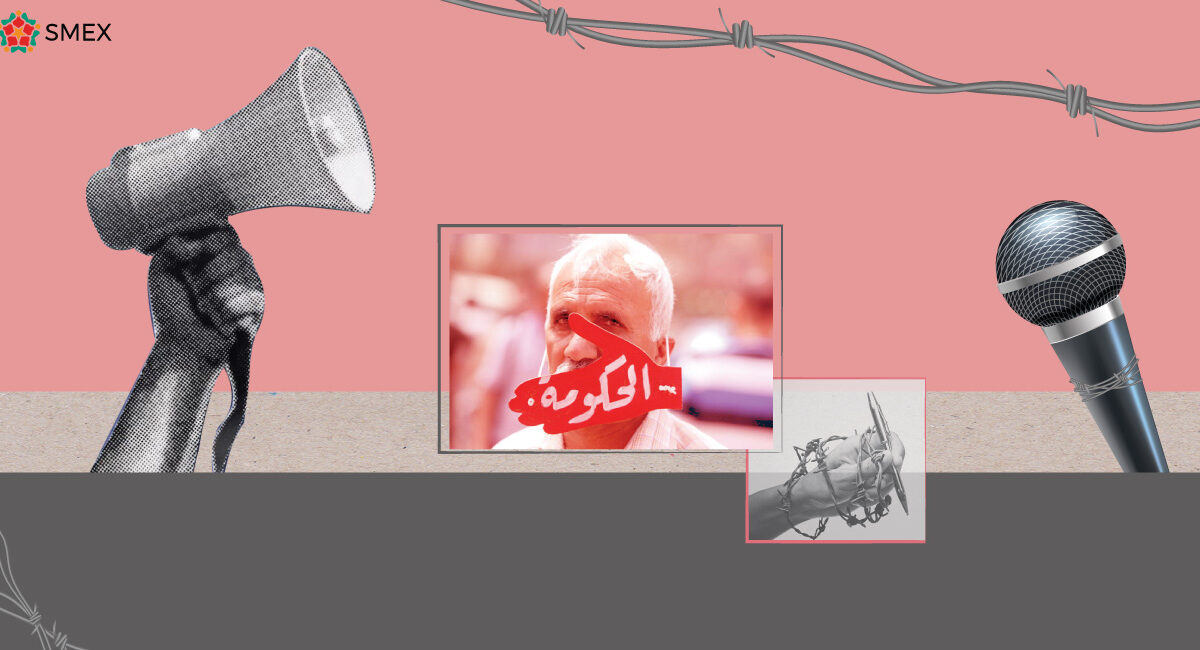The new Iraqi draft law on freedom of expression, assembly, and peaceful demonstration is under scrutiny for possible violations of public freedoms. Critics are worried about vague terms that could overturn social justice and threaten a number of rights.
It all goes back to 2010 when the draft law was submitted to parliament for legislation but faced criticism, leading to its postponement. It was reconsidered in 2016 and faced the same obstacles. Today, the adoption of this law in its current version might put Iraq in a problematic position in relation to its obligations under international conventions guaranteeing freedom of expression.
Iraq is a signatory to the Universal Declaration of Human Rights, which states in Article 19 that: “Everyone has the right to freedom of opinion and expression; this right includes freedom to hold opinions without interference and to seek, receive and impart information and ideas through any media and regardless of frontiers.”
“The provisions of the law should not violate human rights’ principles and the Iraqi constitution; we hope that the law will not restrict freedoms,” stated Joanne Abdullah, vice-chairperson of the Iraq parliamentary Human Rights Committee, to Iraqi media on March 6, 2023.
Freedom of Expression: A Free Principle that Cannot be Restricted
Recently, the Iraqi government and parliament have been trying to pass a series of legislations and laws, such as the cybercrime law, the law on freedom of expression, assembly, peaceful demonstration, access to information law, and to amend the law on intellectual property.
Emad Al-Sharaa, a digital rights activist, told SMEX, “Iraqi legislators are trying to put laws related to social freedoms up for voting all at once, to limit the publication of material that would expose corruption.”
These laws focus in their articles on penalties without suggesting solutions. They limit the right to access information, according to Al-Sharaa, who added that “the Law on freedom of expression, assembly, and peaceful demonstration, and the cybercrime Law, include vague terms that worry Iraqi citizens.” He explained that terms such as “public decency” and “disturbing national security” are vague and loose. For example, concerning public decency, Al-Sharaa stated that “what happens in Basra might not be suitable for Erbil or Baghdad’s communities, and the same applies to other regions.”
Iraqi human rights activist Akram Al-Sayeb told SMEX that legally, the objections to the new law are based on the fact that freedom of expression is one of the constitutional foundations regulating the democratic process and human freedom in the world; thus, it cannot be enacted since it directly impacts a constitutional principle that any specific law cannot restrict.
Al-Sayeb pointed out that it was not possible to combine the terms “freedom of expression” and “peaceful demonstration.” “The right to access information is a constitutional right based on an integrated human rights system. It is the government’s transparency principle when it comes to dealing with citizens, and it is based on the social contract between the state and the people,” he added.
However, the fear that demonstrations and protests would rise again is the pretext used to accelerate the law discussion and attempt to pass it “since Iraq is in a constant state of protest and unstable at all levels,” according to Al-Sayeb.
Is the Iraqi Government Afraid of the People?
According to Muntazer Nasser, editor-in-chief of Al-Aalem Al-Jadeed, an independent online newspaper, the law combines the freedom of expression and the press with the right to demonstrate and does not differentiate between them. It also includes penal sanctions and requires prior permits to demonstrations. It has unidentifiable vague terms and can be interpreted according to the authorities will.
Nasser explained in an interview with SMEX that “the law was introduced in the Parliament in its old version, which dates back to the 2014 parliamentary sessions, without making any amendments that human rights activists and organizations previously presented.”
He also affirmed that he was against the attempt to enact the law because “its purpose is not to protect the freedom of expression guaranteed in Articles 28 and 42 of the Iraqi constitution, but rather to restrict freedoms, especially since it is being enacted with a series of judicial and legislative decisions and procedures that would take the country back to the period before 2003 and put all the achievements made after this year to freedoms and pluralism at stake.”
The judicial campaigns launched by Iraqi authorities to pursue people who post “indecent content” or prosecute “those who disrespect State institutions” are campaigns without any legal grounds built upon laws from the previous totalitarian regime. According to Nasser, they are incompatible with the 2005 Iraqi constitution, which grants citizens the right to freedom of the press, demonstration, and all forms of expression.
Whenever corruption issues are raised, the Iraqi government and parliament revive voting on laws “to influence online speech and target citizens with their opinions and freedoms,” added Al-Sharaa.
In the same context, Hashem al-Nafakh, the executive director of the Iraqi Oma organization for human rights in Iraq, said that authorities do not only want to restrict online speech, but they also want “to restrict the movements in the street by forcing demonstrators to seek permission for demonstrations and movements.” As for passing a series of laws, “it does not even tarnish the image of the Iraqi government in front of the international community, especially since more than 3,000 people were arrested in one year during the October 2019 demonstrations alone.”
Is the Law Appealable?
Moayad Al-Lami, head of the Iraqi Journalists’ Syndicate, had two remarkably opposing positions. In a public intervention during a Parliament hearing held to discuss the draft law on the freedom of expression on March 5, 2023, he said that “the current version of the law on freedom of expression violates Article 38 of the Constitution […] the most important aspect of freedom of expression is press freedom, and it must be included in the draft law in a clear text.” However, in the internal debates, Al-Lami called for banning any demonstrations or sit-ins that did not show official permits issued by the official authorities, according to Iraqi media.
However, according to Nasser, this is expected since “the role of the Journalists’ Syndicate or its head in objecting to the law is almost void due to legal and cultural expectations that make the Syndicate always on the authorities’ side, as people in charge of the Syndicate identify with these authorities.”
As for the parliament, the law can be appealed to be withdrawn, according to Al-Sayeb, “by nine deputies of different political blocs, or by the cabinet through the Iraqi Federal Court.”
On December 3, 2022, 36 deputies in the Iraqi parliament, representing civil authorities and independents, signed a petition calling for the withdrawal of the law as it required amendments. The petition stated, “The deputies who are against the legislation of a law on freedom of expression consider that this right is guaranteed in Article 38 of the Iraqi constitution and that there is no indication therein to regulate it within a law.”



